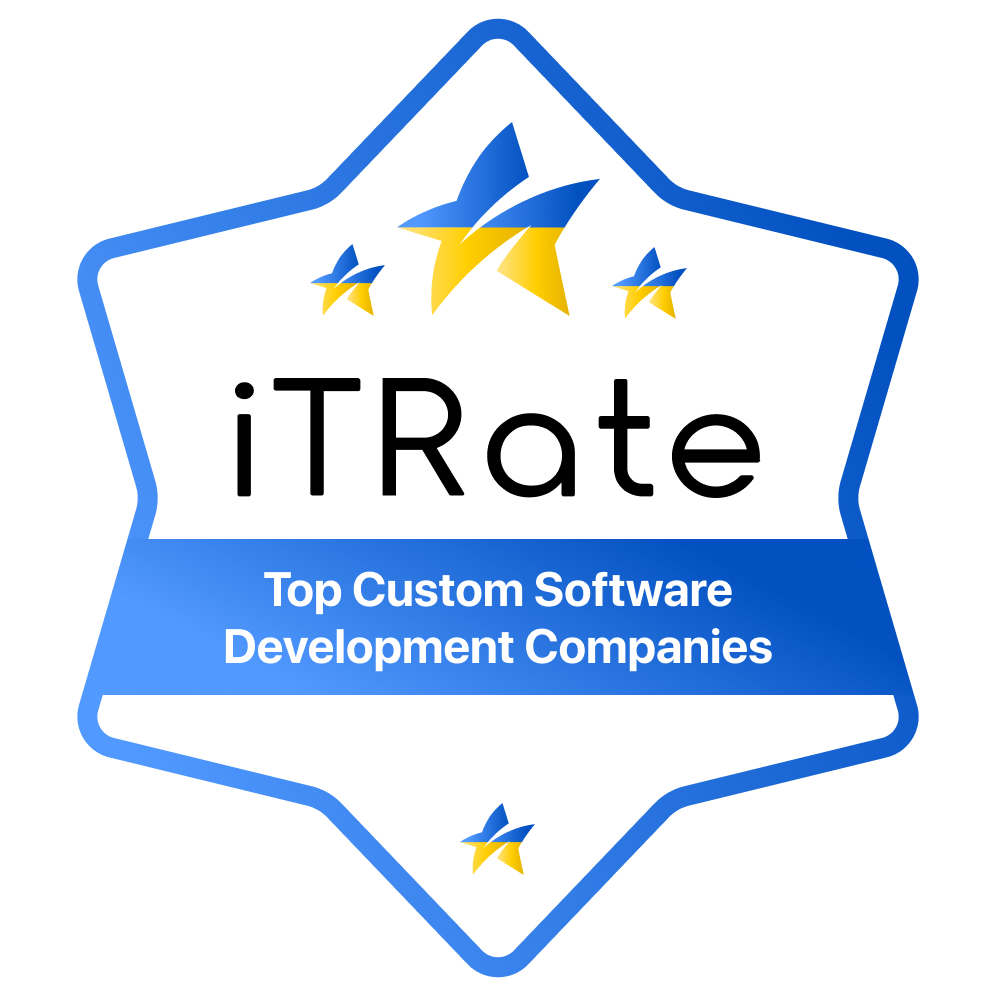AI in Inventory Management: Use Cases, Benefits & Real-World Impact
Discover how AI in inventory management is transforming supply chains. Learn how AI-powered inventory solutions help predict demand, automate stock control, and reduce costs giving your business a smarter, more efficient way to manage inventory.
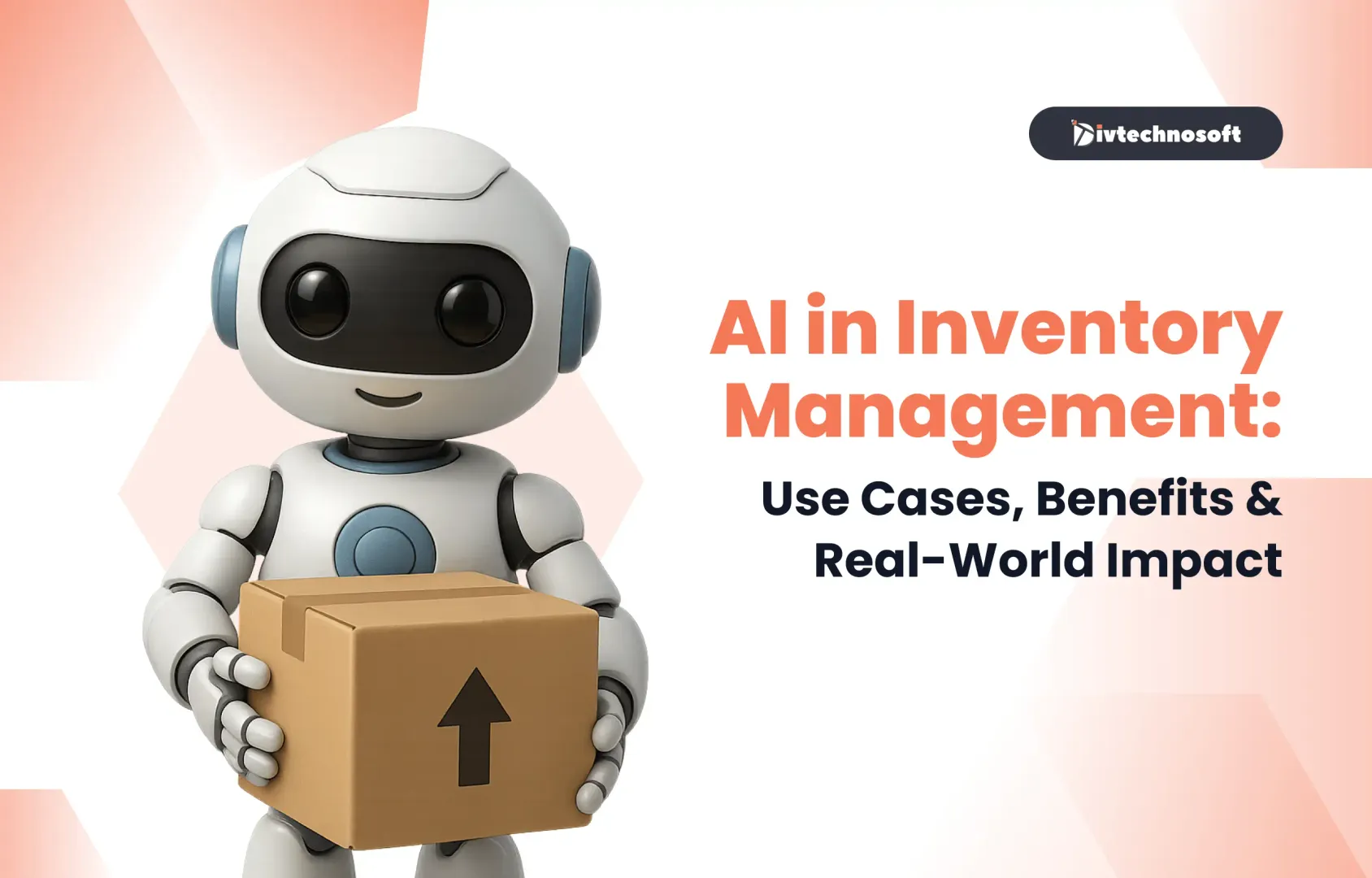
AI in inventory management is transforming how businesses handle stock, forecast demand, and optimize supply chains. Traditional inventory systems often struggle with accuracy and scalability leading to delays, overstocking, or missed sales.
By integrating artificial intelligence into supply chain operations, companies can automate routine tasks, improve data-driven decisions, and reduce operational costs. This blog explores how AI-powered inventory solutions are helping businesses streamline processes, boost efficiency, and stay competitive in today’s dynamic market.
What is AI in Inventory Management?
AI in inventory management uses artificial intelligence to automate and improve how businesses track, manage, and restock inventory.
Instead of depending on manual processes or basic software, AI-powered inventory solutions analyze large amounts of data to make smart decisions.
AI Use Cases in Inventory Management
Here are some key areas where AI is making a big impact:
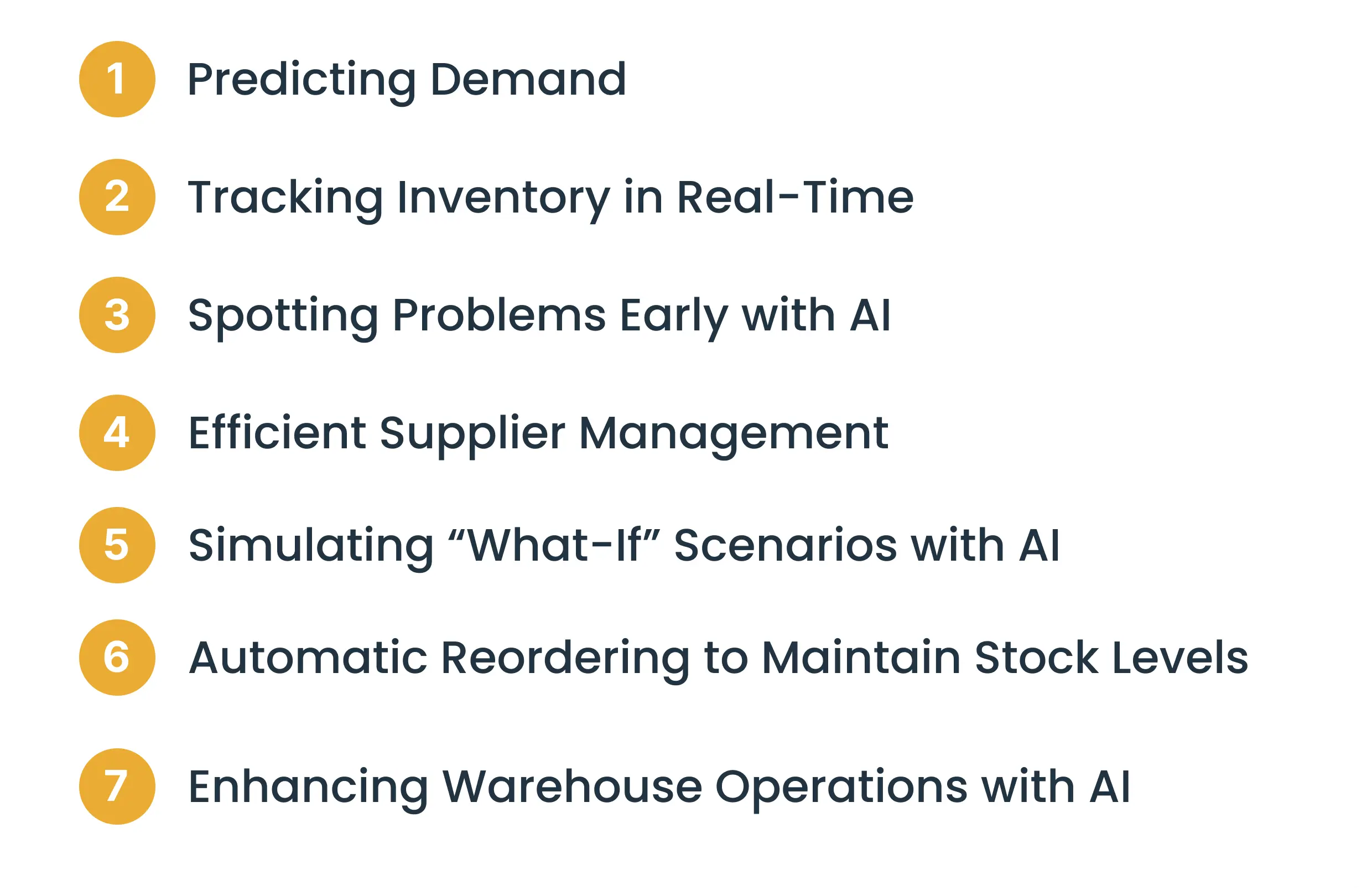
1. Predicting Demand
AI in inventory management is changing the way businesses handle their stocks. One of the most helpful things AI can do is predict demand, this means guessing how much of a product people will want in the future. With the help of AI-powered inventory solutions, it becomes much easier and more accurate.
AI looks at things like past sales, customer habits, seasons, and even current events to figure out what customers might want next. This helps companies know how much to order, when to restock, and which items are most popular.
By using AI in inventory management, businesses can:
Avoid running out of popular items (stockouts)
Stop ordering too much of something (overstocking)
Save money by reducing waste
Make customers happier with faster, more reliable service
Respond quickly if the market changes suddenly
For example, if AI notices that a certain product is selling faster than usual, it can alert the company or even reorder it automatically. This keeps the shelves full and customers satisfied.
AI-powered inventory solutions help companies stay one step ahead. They make inventory smarter, faster, and more flexible without guessing or depending only on human predictions.
2. Tracking Inventory in Real-Time
One of the most powerful benefits of AI-powered inventory solutions is the ability to track inventory in real time. By integrating Artificial Intelligence into the supply chain, companies gain real-time visibility into stock levels, product location, and sales trends. This helps prevent shortages and enables faster decision-making.
3. Spotting Problems Early with AI
AI doesn’t just track inventory, it also looks for patterns. If something unusual happens, like a sudden drop in stock or a missing item, AI can alert businesses right away. This early detection helps companies address potential issues before they become bigger problems.
4. Efficient Supplier Management
Managing suppliers effectively is key to maintaining a smooth supply chain. AI in inventory management can analyze supplier performance, delivery times, and product quality, enabling businesses to choose the best suppliers and keep operations running smoothly.
5. Simulating “What-If” Scenarios with AI
AI-powered inventory solutions can simulate different scenarios, such as sudden spikes in demand or disruptions in supply chains. This helps businesses plan for the unexpected and stay ahead of potential issues.
6. Automatic Reordering to Maintain Stock Levels
AI can automate the process of reordering inventory when stock runs low. By monitoring sales trends and stock levels, AI ensures that businesses never run out of critical items, reducing manual intervention and improving efficiency.
7. Enhancing Warehouse Operations with AI
AI plays a crucial role in optimizing warehouse workflows. From suggesting better ways to organize stock to help speed up product movement, Artificial Intelligence in the supply chain helps reduce errors and boost productivity in the warehouse.
Top Benefits of Using AI in Inventory Management
By automating processes, improving accuracy, and enabling smarter decision-making, AI-powered inventory systems offer a wide range of benefits that can improve efficiency and boost profitability.
Here are some of the top advantages:
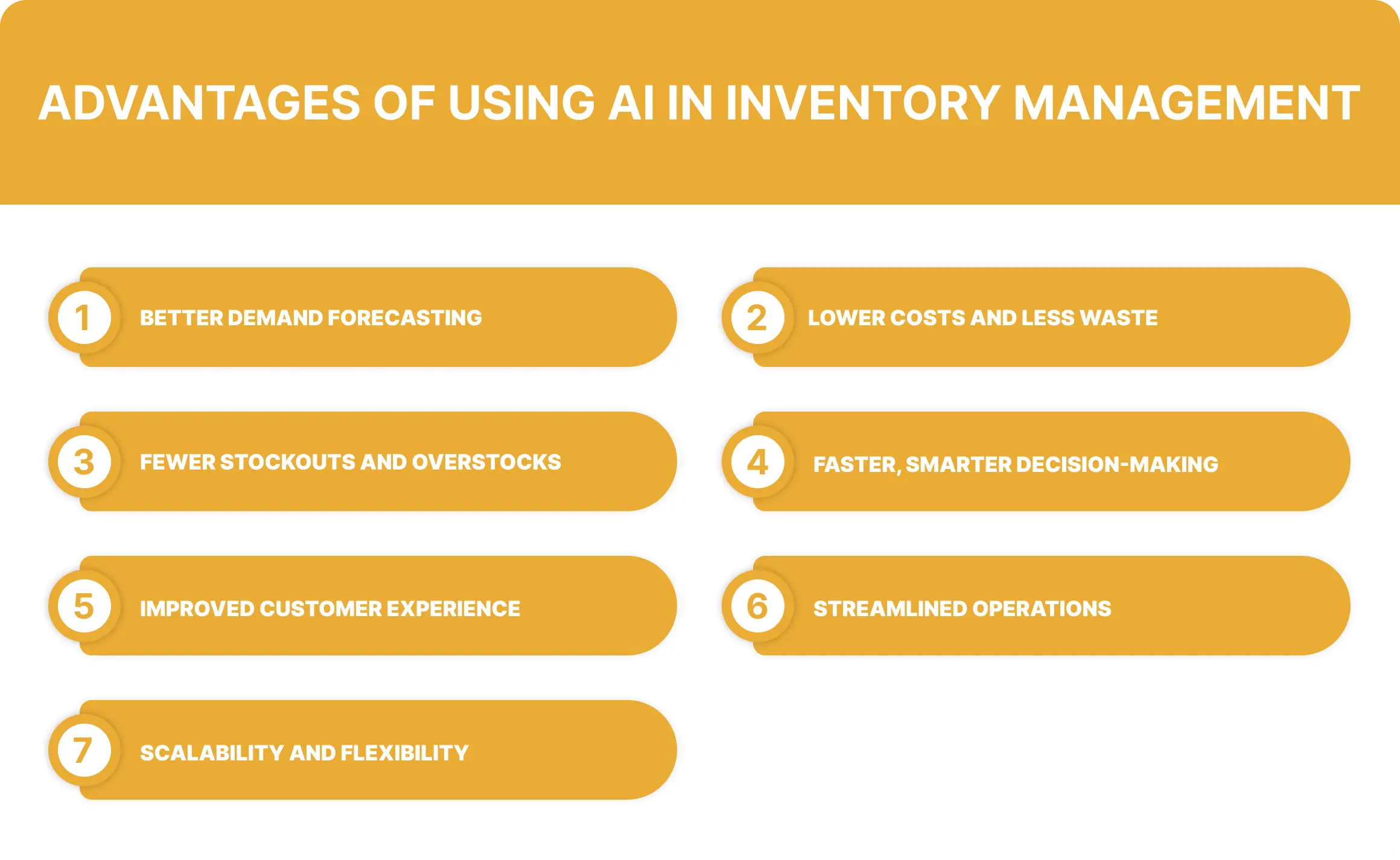
1. Better Demand Forecasting
AI analyzes historical sales data, customer behavior, seasonal trends, and even external factors like weather or news events. This leads to more accurate forecasts, helping businesses stock the right products at the right time.
2. Lower Costs and Less Waste
With smarter ordering and reduced overstocking, businesses can lower storage costs and avoid unnecessary waste. AI ensures that inventory levels are optimized, so resources are used efficiently.
3. Fewer Stockouts and Overstocks
AI helps maintain the perfect balance avoiding both empty shelves and overfilled warehouses. This means more satisfied customers and less money tied up in unsold stock.
4. Faster, Smarter Decision-Making
Real-time insights allow teams to make quick, informed choices. Whether it’s reordering products or reacting to sudden demand changes, AI gives managers the tools to act fast and effectively.
5. Improved Customer Experience
By ensuring products are available when customers need them, AI helps businesses deliver a more reliable and consistent shopping experience boosting customer satisfaction and loyalty.
6. Streamlined Operations
AI reduces the need for manual tracking and data entry. Automation frees up staff to focus on higher-level tasks, improving productivity across the entire supply chain.
7. Scalability and Flexibility
As businesses grow, AI systems easily scale with them. Whether handling seasonal spikes or expanding to new markets, AI provides the flexibility needed to adapt without interruptions.
How AI Improves Supply Chain Visibility and Control
AI helps businesses see what is happening across their entire supply chain in real-time. This improved visibility means companies can track inventory levels, shipments, and supplier performance more clearly and quickly than before.
With better data from AI systems, businesses gain greater control by making faster, smarter decisions. For example, AI can alert teams to delays or shortages early, allowing them to adjust orders or find alternative suppliers before problems get worse.
In short, AI turns raw data into clear, actionable insights, so companies can monitor their supply chains continuously and respond immediately improving both visibility and control.
Challenges and Considerations When Implementing AI in Inventory Management
Adopting AI-powered inventory solutions can bring major improvements, but there are key challenges businesses need to be aware of:
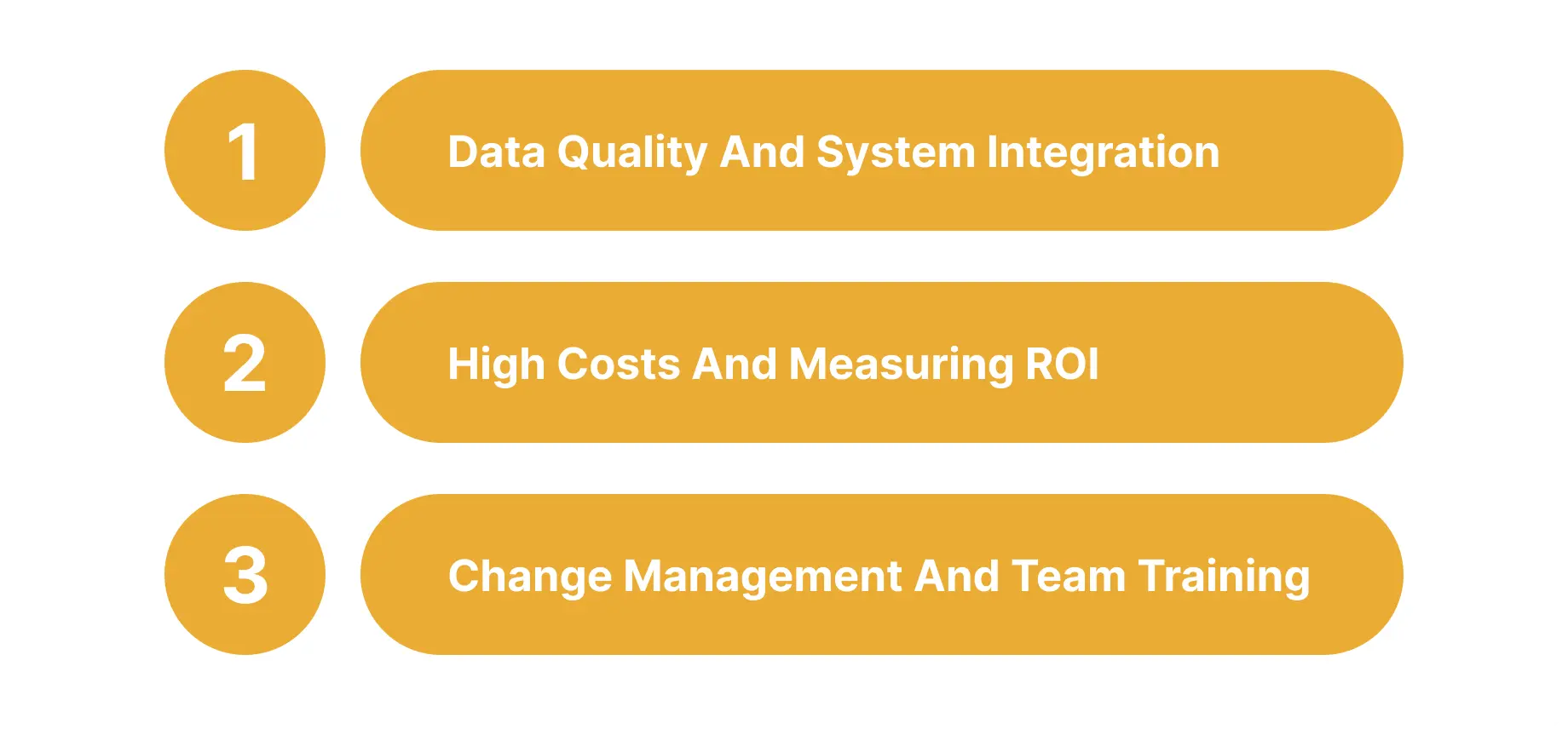
1. Data Quality and System Integration
AI in inventory management depends heavily on clean, accurate, and up-to-date data. Poor data can lead to wrong predictions and decisions. Businesses must also ensure AI tools integrate well with their existing inventory systems and supply chain platforms.
2. High Costs and Measuring ROI
Implementing AI solutions often requires a significant investment in software, hardware, and skilled professionals. It’s important to clearly define goals and track ROI (Return on Investment) to ensure the technology is delivering value over time.
3. Change Management and Team Training
Bringing AI into daily operations can change how teams work. Employees need proper training to understand and use new systems effectively. Resistance to change is common, so clear communication and ongoing support are key.

How AI Is Transforming Inventory Management Across Industries
AI in inventory management is helping many industries work smarter, reduce waste, and meet customer needs. Here’s how different sectors are using AI-powered inventory solutions:
1. Retail
Retailers use AI to manage stock levels more accurately, especially during busy seasons. With tools like computer vision, they can track inventory in real time and improve the shopping experience. E-commerce stores also use AI to automate order fulfillment, manage a wide variety of products, and even analyze customer reviews or social media trends to understand demand.
2. Manufacturing
Manufacturers use AI to plan production based on inventory levels and demand forecasts. AI helps with “just-in-time” inventory, where companies keep only what they need saving money, reducing waste, and improving efficiency.
3. Wholesale and Distribution
Wholesalers manage large inventories across many locations. AI helps them track stock more easily, avoid overstock or shortages, and handle many supplier relationships smoothly.
4. Food and Beverage
AI helps businesses keep track of food that goes bad quickly and reduce waste. Restaurants can use AI to look at past sales and trends to change menus and keep the right ingredients in stock.
5. Healthcare and Pharmaceuticals
Hospitals and clinics use AI to track medical supplies and equipment so they don’t run out. Pharmacies and drug companies use AI to manage stock, avoid expired items, and stay within safety rules and regulations.
6. Construction
Construction companies use AI to plan and manage materials for different projects. AI can look at project schedules, past data, and outside factors (like weather or delivery times) to make sure materials are ordered and delivered at the right time.
Conclusion
As businesses continue to grow and adapt to changing market demands, the need for smarter, more reliable inventory management becomes more important than ever. AI offers a powerful solution by making inventory processes faster, more accurate, and more cost-effective.
By integrating AI into inventory management, companies can improve efficiency, reduce waste, and make better decisions in real time. In a fast-moving and competitive market, this kind of advantage can set a business apart making AI not just a helpful tool, but a smart investment for long-term success.
FAQs
1. How does AI predict inventory demand?
AI uses historical sales, seasonal patterns, marketing campaigns, and even social media or weather data to forecast demand. This helps businesses stock the right products at the right time and avoid guesswork.
2. Is AI replacing humans in inventory management?
No, AI supports human teams by handling repetitive tasks and providing better insights. It helps people make faster, more accurate decisions, but it doesn’t replace the need for human strategy or oversight.
3. What are the benefits of using AI for inventory control?
AI helps businesses reduce waste, lower storage costs, and avoid stockouts. It also provides real-time insights that support faster decision-making and better customer service.
4. Can small businesses use AI in inventory management?
Yes! Many cloud-based AI tools are affordable and easy to use. Small businesses can benefit from better forecasting, auto-reordering, and real-time stock tracking without needing large budgets or IT teams.





